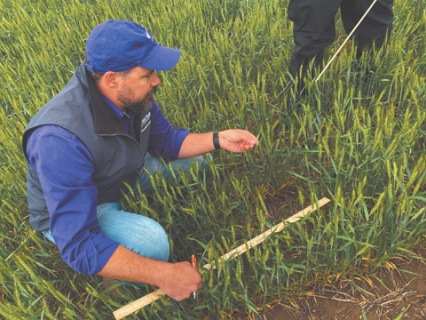
The investigator announced that two Chinese student trainees were trying to smuggle into the United States a fungus that infects winter wheat and other grains. The young man managed to escape and escape to China, and his girlfriend was arrested. This trial gained wide resonance against the background of the fact that the White House accused Chinese students of having links with security authorities in Beijing and began to deprive them of entry visas.
There are questionable points in the lawsuit initiated by the American justice system. To begin with, student Liu Zunyong was detained on arrival at the Detroit airport last July with small bags. The customs officers offered him to open the bags, but he said that it was not his luggage. Then he admitted that it was his stuff. The fungus was discovered, and yet the student was not arrested. After all, Liu explained that he has access to the University of Michigan laboratory on some days, and on other days his girlfriend Jian Yongqing will help him conduct research.
This contagious fungus is well known to farmers, especially in the northern and eastern states. It can cause damage to winter wheat, barley, and rice. The U.S. Department of Agriculture conducted a survey last year and found the fungus in 32 states.
Jerome Gordon, interim prosecutor of Detroit, stressed that the researchers’ actions “created the most serious risk to national security.” What is the risk?
The Chinese were trying to deliver “weapons of potential agrarian terrorism to the very heart of America.”
This legal case arose at a time when the administration of US President Donald Trump is launching a large-scale campaign aimed at restricting, if not completely prohibiting, the issuance of visas to Chinese students to study at American universities. The authorities claim that these young people extract technological secrets from American laboratories, as well as trade secrets, and transfer them to the appropriate institutions in their homeland.
Did the prosecutor want to play along with Trump? The press doesn’t write anything about it. But you wouldn’t envy a runaway Chinese student’s girlfriend. Not only has she been in prison for almost a year, she has been taken to court and is being interrogated. And there is evidence against her.
Jian and her boyfriend Liu exchanged messages on the phone. From these messages intercepted by American intelligence agencies, it is clear that the couple may have secretly imported some materials into the United States before. So, in 2022, Jian carried something in her shoe. And in early 2024, Jian received a package in the form of a book from a colleague in China, in which a plastic bag was hidden. Last year, as can be seen from the contents of her mobile phone, the girl submitted a report on her work to a Chinese university. In this questionnaire-like document, she promised to remain loyal to the leadership of the Chinese Communist Party, love the motherland, study well, and rally her fellow students. Jiang and Liu are charged with conspiring, making false statements, and forging visas.
American security services have been monitoring Chinese scientists working in the United States for decades. Sometimes those of them who were suspected of stealing scientific secrets or business data were arrested. The Trump administration has gone much further along this path. She stripped an undisclosed number of students of visas that had previously been issued to them.
Some experts say that this approach does more harm to American scientific research than good. After all, this campaign puts a spoke in the wheels of approximately 277,000 Chinese students who come to the United States every year to get an education.
But the case of Jian and Liu is still special. For the first time, Chinese students are not being persecuted because they wanted to get an American secret and take it home. Everything is different here. This pair is charged with delivering a harmful element to the United States.
